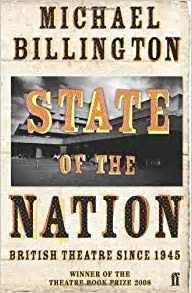| State of the Nation- Theatre Book of the Year |
Theatre History |
| Michael Billington , Faber & Faber , December 15, 2007 |
 The subject matter of “State of the Nation” is sixty years of theatre history. It has the weight of detail and personal experience that only Michael Billington could bring to such an undertaking. Its goal is to link theatre to the context of a Britain in historical change and convulsion. It is underpinned by the quality of writing that is able to capture the general, locate the significant and render it in sharp précis of description.
The subject matter of “State of the Nation” is sixty years of theatre history. It has the weight of detail and personal experience that only Michael Billington could bring to such an undertaking. Its goal is to link theatre to the context of a Britain in historical change and convulsion. It is underpinned by the quality of writing that is able to capture the general, locate the significant and render it in sharp précis of description. Thus, on Terence Rattigan: “a traditionalist drawn to classical structures and reticent understatement: thematically, he endorsed defiance of convention and society's repressive rules.” Billington alights on the forgotten, gay-coded “Accolade” and writes of Emlyn Williams: “it was Williams' Celtic obsession with doubleness and ambiguity that marked him out as a peculiarly fascinating writer.” The future is unguessable and Priestley's persistence to twenty-first century GCSE set text would have surprised. Of “An Inspector Calls” he writes “Priestley is less an Edwardian throwback than an early example of a Bertolt Brecht...has the instincts of a social engineer as well as a demolition expert.” These first two decades of the book saw the arrival of Beckett at the Arts Theatre. Peter Hall makes use of silence as it has never been used before. Silence in Beckett is “not just to heighten dramatic tension but as a reminder of cosmic solitude.” “State of the Nation” follows the directors who made their first impact. Hall first appears as a 22 year old directing John Whiting's “Saints Day”. William Gaskill becomes Brecht's leading director in Britain. Tony Richardson observes of Archie Rice singing a blues song and collapsing as “the single most thrilling moment I've had in theatre”. John Dexter mounts “the Royal Hunt of the Sun” at Chichester. Joan Littlewood takes her company to Paris. The actors transport the sets and costumes as hand luggage and do not have the money for the fare home. But innovation lives side by side with popular theatre and Billington provides reminders of the plays that continued to bring in the money. Hugh and Margaret Williams are co-authors of the hugely successful “Plaintiff in a Pretty Hat”. Its subject is the financial distress of a Welsh earl who is obliged to rent out his estate and slum it in a Belgavia mews house drinking pink champagne. The summaries of Britain's political landscape are reinforced with the tiniest slivers of autobiography. Billington is old enough to remember the awfulness of powdered eggs. Every child knew the rationing of sweets. In the unbearable winter of 1947 he remembers his mother “literally begging for a sack of coal.” At eleven he is old enough to remember the Festival of Britain, in particular the Emmett railway. Like every working-class boy with a scholarship he meets an Oxford of others. It is 1958 and populated by “an upper class set who possessed an ease, social assurance and braying lung-power that I both envied and cordially detested.” A paragraph on the sixties has a line on a brief disastrous spell working on a Liverpool newspaper These first two decades see the formation of institutions, and much politicking, in the RSC and the National. A book is a direct link between writer and reader. Billington's first period takes 160 pages. At that point my reading shifts joltingly. “State of the Nation” ceases to be history and becomes part of my biography. |
Reviewed by: Adam Somerset |
This review has been read 1117 times There are 29 other reviews of productions with this title in our database:
|
